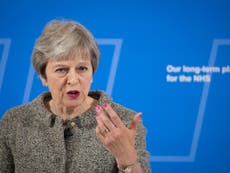Theresa May's narrow win in the Commons today has not strengthened her position when it comes to Brexit
May probably calculated it was better to go down fighting the pro-Europeans over the ‘meaningful vote’ rather than to cave in and anger hardline Brexiteers. The danger is that in trying to hold her party together, she alienates both its factions

Theresa May has survived another challenge on Brexit after a revolt by pro-European Conservatives fizzled out in the Commons this afternoon. They persuaded ministers to make a last minute concession about the vote MPs will get on the withdrawal agreement or if there is no deal. As a result, the government defeated calls for a “meaningful vote” by 319 to 303.
It was a pretty small concession: a promise that the government will allow MPs to table motions and call a debate before a “no deal” exit happened, and that the speaker would have the power to allow MPs to amend the statement made by ministers if no EU agreement is reached by 21 January next year.
Narrow party interest has again trumped the national interest. In practice, the Conservatives’ compromise may well fall short of the truly “meaningful vote” the pro-EU Tories and the House of Lords wanted to secure. There are already different interpretations of this fudge; the vote may prove rather meaningless.
As usual, May put off the crucial battle to another day. She has turned this into something of an art form. Sooner or later she will run out of time because the two-year Brexit process is time limited. She may have avoided a humiliating defeat today but her path on Brexit will be strewn with obstacles over the next few weeks.
The danger is that in trying to hold her party together, May alienates both its factions. The pro-Europeans, all but half a dozen of whom backed down today, feel bruised she did not fully honour her offer of a “meaningful vote” in a meeting with them last week to head off defeat on the issue then. They should be wary of trusting her in future – for example, when the Commons votes on customs next month, she may send conflicting signals to the two Tory tribes.
Hardline Eurosceptics would have been furious if the pro-Europeans had defeated the government today but don’t trust May either. To use her own word, Brexiteers will have to swallow some “unpalatable” medicine. She will soon dilute her red lines in order to break the latest deadlock in the EU talks, to stop “no deal” becoming a reality due to the ticking clock.
Eurosceptics do not like her proposed “backstop” to prevent a hard border between Northern Ireland and the Republic of Ireland, as it would mean sticking close to the single market and customs union on a UK-wide basis rather than the clean break they want.
Similarly, they will not welcome her “customs arrangement”. They suspect May’s white paper setting out a vision of the UK’s long-term relationship with the EU will mean a single market for goods (but not services); continuing payments to the EU (no “Brexit dividend” for the NHS there); a continuing role for the European Court of Justice and possibly something close to free movement for EU citizens. These options will be considered at a Chequers summit next month and may yet trigger another bout of threatened ministerial resignations (or maybe even a real one).
With such proposals in play, May probably calculated it was better to go down fighting the pro-Europeans over the “meaningful vote” rather than to cave in and anger hardline Brexiteers. Another reason is that she wants the choice for MPs at the end of the negotiations to be between her deal and “no deal”. She assumes (rightly) that Labour will vote against whatever deal she gets, as Jeremy Corbyn sees parliament rejecting her deal as his best chance of forcing a general election before the one due in 2022. So she wants to put maximum pressure on Tory MPs to back her deal.
Labour will no doubt accuse the pro-EU Tories of talking a good rebellion but again melting away when the crunch vote came. But Corbyn cannot crow too loudly: a handful of pro-Brexit Labour MPs were happy to defy him and save May from defeat on a “meaningful vote”.
Like May, the pro-European Tories can claim they live to fight another day. In climbing down, their unofficial leader Dominic Grieve reserved his right to do everything to block a “no deal” exit at the time. But most of his group cracked under pressure from Downing Street and the whips this time, so there is little reason to think they would stand firm under even greater pressure on the last lap of the Brexit marathon.
May has been trying to push the Commons into supporting a harder version of Brexit than it wants. She has often acted as if she had won the big majority she expected at the election a year ago. In fact, losing her majority meant the die was cast for a softer Brexit. It has been a long time coming. Perhaps it will finally emerge in the next few weeks.
Today’s vote was another opportunity missed. At some point, the natural Commons majority for a softer Brexit must assert itself. MPs who believe close economic links with the EU are in the national interest must finally put that before narrow party interests before it is too late.



Join our commenting forum
Join thought-provoking conversations, follow other Independent readers and see their replies